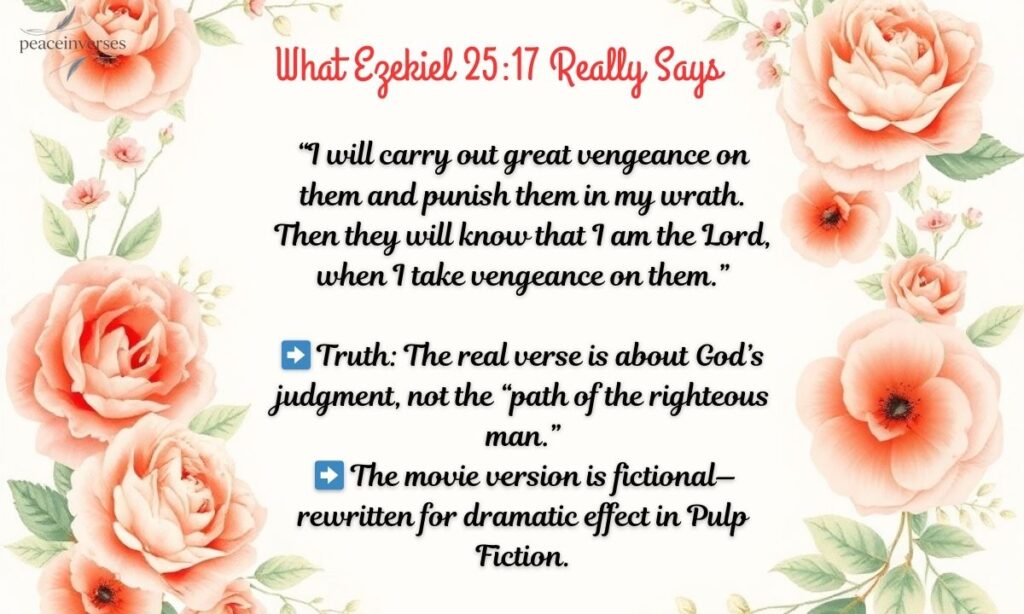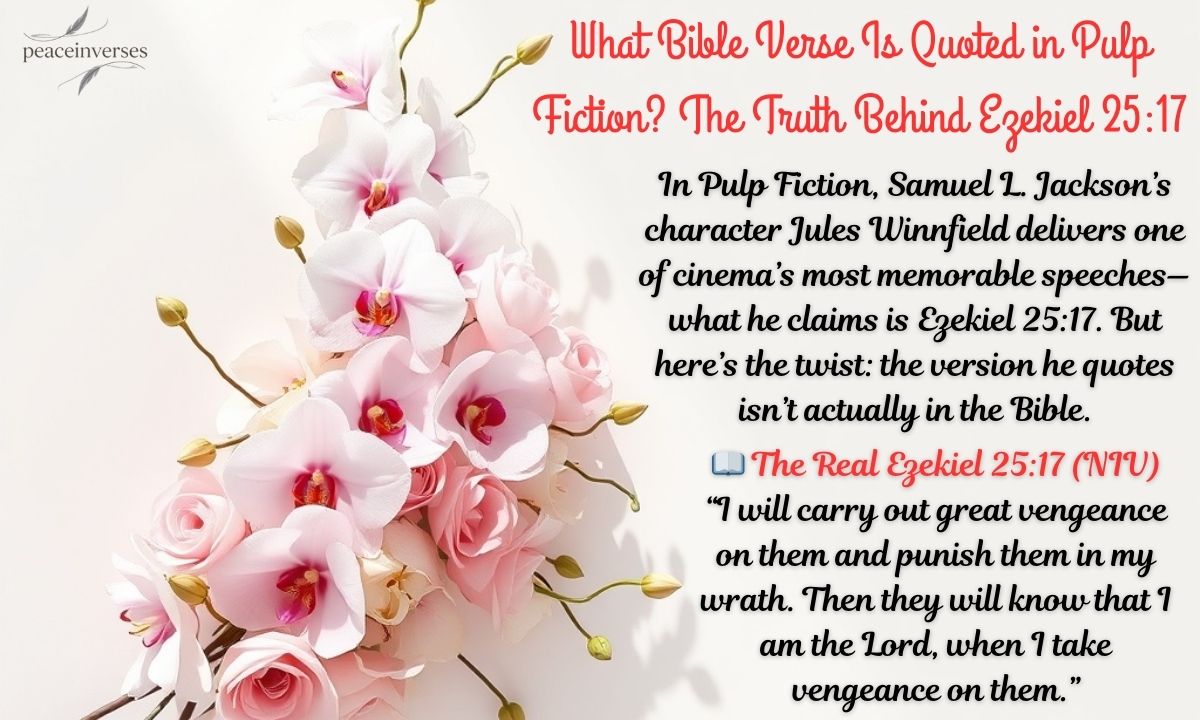If you’ve seen Pulp Fiction, you’ll never forget Samuel L. Jackson’s chilling speech. With his gun pointed, he recites what sounds like a powerful Bible verse: Ezekiel 25:17. But here’s the twist—what he quotes isn’t really in the Bible.
The scene is iconic, but the “verse” is more Hollywood than Scripture. The real Ezekiel 25:17 says something very different, and the movie version mixes a few biblical themes with creative writing. Let’s uncover the truth behind one of cinema’s most famous “Bible quotes.”
The Famous Verse from the Movie
In Pulp Fiction, Ezekiel 25:17 became one of the most famous “Bible quotes” in cinema. Samuel L. Jackson’s speech feels powerful, but much of it was rewritten by the filmmakers.
The real verse is very different from the movie version. What you hear on screen is a mix of fragments, not a true biblical passage. It’s Hollywood storytelling with a biblical flavor.
Ezekiel 25:17 (Pulp Fiction)
Movie Version: “The path of the righteous man is beset on all sides by the inequities of the selfish and the tyranny of evil men…”
Real Verse: “I will carry out great vengeance on them and punish them in my wrath. Then they will know that I am the Lord, when I take vengeance on them.”
The film’s speech is almost entirely fictional. It uses biblical-sounding words but strays far from the text. The true Ezekiel 25:17 speaks about God’s vengeance against enemies, not about the righteous man. The change gave the movie dramatic weight but left viewers thinking it was Scripture.
Other “Bible Verses” You Think Are Real (But Aren’t)
“God Helps Those Who Help Themselves”
This line is often quoted as if it were a Bible verse, but it’s not. It actually comes from Benjamin Franklin’s Poor Richard’s Almanack.
The Bible teaches the opposite: God helps those who cannot help themselves. Verses like Psalm 121:1-2 remind us that help comes from the Lord. Hollywood and culture often repeat this line because it sounds moral, but it misrepresents biblical truth about grace and dependence on God.
“Cleanliness is Next to Godliness”
Many films and shows use this phrase as if it comes from Scripture. It is not found anywhere in the Bible. Instead, it first appeared in a sermon by John Wesley in the 18th century.
While the Bible values purity of heart and living clean before God, it never equates physical cleanliness with godliness. Movies and pop culture use it as a catchy line, but the Bible focuses on spiritual purity (Psalm 51:10), not hygiene slogans.
“Money is the Root of All Evil”
Movies and TV often quote this phrase to show greed and corruption. But the Bible doesn’t say that. The real verse is 1 Timothy 6:10: “For the love of money is a root of all kinds of evil.”
The difference is huge. Money itself isn’t evil—it’s a tool. The love of money, when it becomes an idol, is what leads to evil actions. Hollywood’s simplified version misses the depth of the biblical teaching and often leaves people misinformed.
“Spare the Rod, Spoil the Child”
Films and books often present this line as a strict Bible command. It isn’t a direct verse but comes from a 17th-century poem by Samuel Butler. The idea loosely connects to Proverbs 13:24, which speaks about discipline.
The Bible promotes loving discipline, not cruelty. Proverbs highlights correction as a way of showing love, guiding children toward wisdom. The phrase “spare the rod, spoil the child” sounds harsh and oversimplifies Scripture. Hollywood uses it for dramatic effect, but the biblical view is balanced discipline with love.
What Ezekiel 25:17 Really Says

The movie Pulp Fiction turned Ezekiel 25:17 into one of the most quoted “Bible verses” ever. But the truth is, the actual verse is very different from what Samuel L. Jackson recites.
The real verse is not about “the path of the righteous man” but about God’s judgment on His enemies. It is shorter, direct, and focused on divine justice, not human character.
Ezekiel 25:17 — “I will carry out great vengeance on them and punish them in my wrath. Then they will know that I am the Lord, when I take vengeance on them.”
This shows God’s power and authority, not a poetic speech about righteousness. The film version borrowed the tone of Scripture but rewrote the content to fit its story.
Why Did Tarantino Use This Verse?
Quentin Tarantino is known for mixing style, violence, and deep dialogue. He wanted a passage that sounded biblical, heavy, and unforgettable.
By using Ezekiel 25:17, even in a rewritten form, he gave Jules’s character a sense of fear and authority. The verse adds a spiritual weight to the violence in the scene.
The choice wasn’t about accuracy but about impact. Tarantino used the Bible’s voice to make his character sound both terrifying and wise. It became one of the film’s most iconic moments.
A Fictional Quote, A Real Message
Even though the “verse” is not real Scripture, many viewers found meaning in it. The mix of vengeance, justice, and righteousness felt powerful.
Some even believed it was a genuine Bible passage, which shows how convincing the writing was. It blurred the line between Hollywood storytelling and biblical truth.
The lesson here is simple: always check what the Bible really says. The Pulp Fiction quote may be fictional, but the Bible’s real message about justice and mercy is far more profound.
Final Thoughts
The Bible is often quoted in movies, but not always accurately. Pulp Fiction shows how Scripture can be reshaped to create powerful drama. The real Ezekiel 25:17 is about God’s judgment, not the “path of the righteous man.” Understanding this helps us see the difference between Hollywood fiction and biblical truth. Always look back to the Word itself for real wisdom and guidance.
Frequently Asked Questions
What Bible verse is quoted in Pulp Fiction?
The film quotes Ezekiel 25:17, but the version used is rewritten, not the real text.
Is Ezekiel 25:17 real in the Bible?
Yes, but the actual verse is shorter and speaks of God’s vengeance and judgment.
Why did Jules use the verse in Pulp Fiction?
It gave his character authority, drama, and a spiritual tone before acts of violence.
Did Tarantino write the fake version on purpose?
Yes, he adapted and expanded the verse for cinematic impact and memorability.
Why do people think it’s a real Bible verse?
Because it sounds biblical and is quoted with conviction, many assume it is authentic.
What is the true lesson from this?
Always go back to Scripture itself. Movies may inspire thought, but the Bible carries the real truth.

Muhammad Shoaib is a passionate faith-based writer with over 10 years of experience in creating meaningful content centered around prayers, Bible meanings, scriptural teachings, and heartfelt wishes. He is the lead writer at PeaceInVerses.com, where he shares spiritual insights and uplifting messages to guide and inspire readers on their faith journey.

